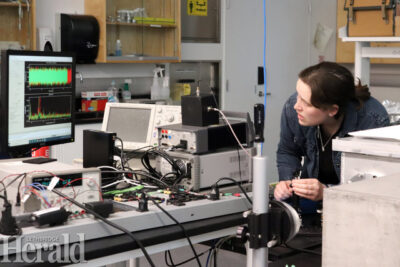Canadian Space Agency grant helping U of L reach for the stars
By Alejandra Pulido-Guzman - Lethbridge Herald on May 14, 2022.
 Herald photo by Alejandra Pulido-Guzman
U of L Gates Cambridge Scholar Alicia Anderson calibrates a new spectrometer concept that is beind developed for a future far-infrared space mission Wednesday at a lab in the University of Lethbridge Science Commons.
Herald photo by Alejandra Pulido-Guzman
U of L Gates Cambridge Scholar Alicia Anderson calibrates a new spectrometer concept that is beind developed for a future far-infrared space mission Wednesday at a lab in the University of Lethbridge Science Commons.LETHBRIDGE HERALDapulido@lethbridgeherald.com
The University of Lethbridge has received a $100,000 grant from the Canadian Space Agency (CSA) to train the next generation of space scientists.
Physics and astronomy professor and head of the Astronomical Instrumentation Group (AIG) at University of Lethbridge, David Naylor, said they have been funded by the CSA for 20 years for various projects, including two instruments they have in space at the moment, but this grant was specifically for training students.
“Our research is based upon making the most sensitive instruments that that you can to explore the universe,” said Naylor.
The main objectives of this project are to develop the world’s first cryogenic post-dispersed polarizing Fourier transform spectrometer (PDPFTS), and to investigate the challenges associated with this concept under realistic space conditions. The PDPFTS is considered the necessary next step in space exploration for investigating galaxy evolution and the farthest reaches of our universe.
“When you develop instrumentation, nobody’s ever built any of this stuff so you’ve got to create, you’ve got to understand the problem,” said Naylor.
Naylor said they have developed concepts for the next generation of space exploration missions and instruments concepts.
“We have a lot of stuff, we have millions of dollars worth of equipment, but you need to train the next generation of bright minds and that is what this grant is for,” said Naylor.
He said as a research facility, they go to different granting agencies with specific ways of spending them in mind.
“Some people give you money for infrastructure, some give you money for experiments to play around with and then the people at the CSA would say ‘look, you’re good at what you do, you trained so many students’ so they said go train some more, here is some money,” said Naylor.
His previous trainees include one that built the motor that operates the drill on NASA’s Insight lander that currently rests on the surface of Mars.
“I train bright minds, they go out and it is the world that benefits,” said Naylor.
He said with the grant he is training a student who arrived from the University of Alberta, one that will arrive Monday from Carlton University, U of L Gates Cambridge scholar Alicia Anderson and U of L PhD in Physics student Adam Christiansen.
The University of Lethbridge is one of 21 post-secondary institutions in the country to receive a grant through the CSA’s Flight and Fieldwork for the Advancement of Science and Technology (FAST) funding initiative.Â
The grants support the development of space technology by providing students and young researchers with hands-on experience.
Follow @APulidoHerald on Twitter
4-3




